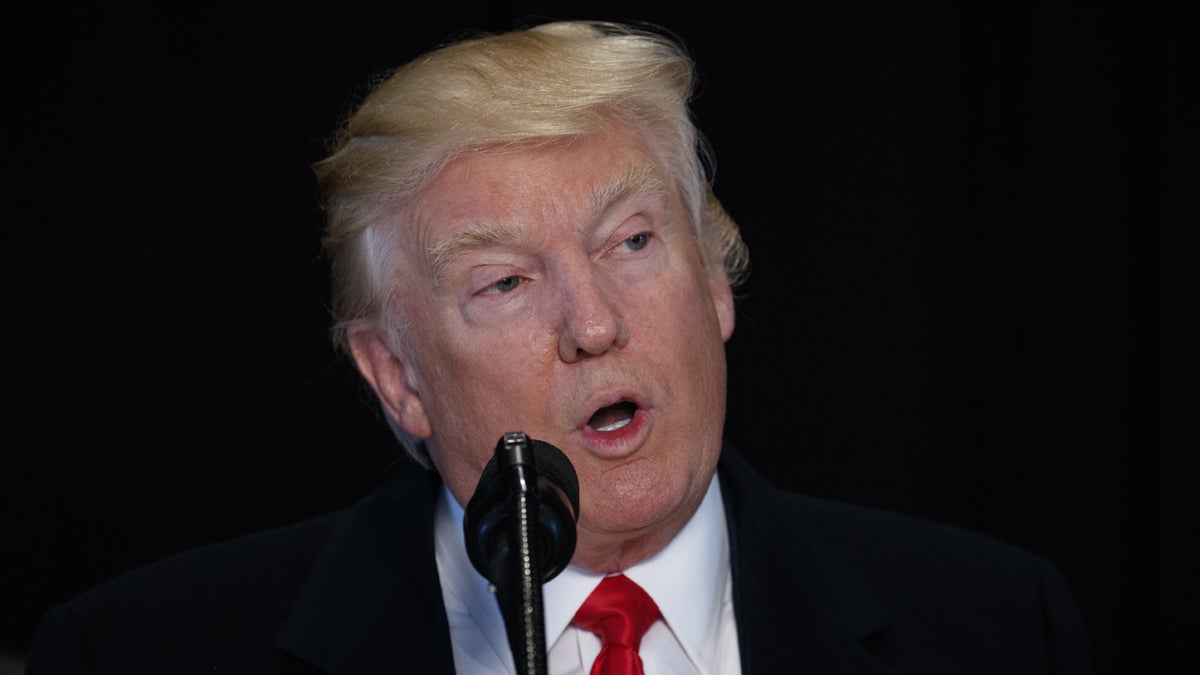Trump finally says something sympathetic about Jewish people

President Donald Trump speaks in Washington, Tuesday, Feb. 21, 2017. The president denounced threats against Jewish community centers as 'horrible,' his first forceful statement against anti-Semitism. Earlier botched attempts to address the issue and an angry encounter with a Jewish reporter last week have fueled concerns that Trump emboldens bigots. (AP Photo/Evan Vucci)
After many weeks of swinging and missing at very soft pitches, Trump finally connected yesterday. Even this tone-deaf narcissist couldn’t withstand the mounting pressure to state the obvious.
“The anti-Semitic threats … “
Finally! Come on, Prez, you can do it!
“… targeting our Jewish community and community centers …”
That’s it! Keep going!
“… are horrible, and are painful …”
Just a few more syllables! Hang in there!
“… and a very sad reminder of the work that still must be done to root out hate and prejudice and evil.”
Bravissimo! Spoken just like a real president!
After many weeks of swinging and missing at very soft pitches, Trump finally connected yesterday. Even this tone-deaf narcissist couldn’t withstand the mounting pressure to state the obvious. The big question now is whether his words were sincerely uttered, and whether he’ll commit to act on them. He didn’t demand that Jeff Sessions’ Justice Department form a task force or even lift a finger.
Anti-Semitic incidents — bomb threats to Jewish community centers, the weekend vandalism in a Jewish cemetery in Missouri — have spiked in the wake of Trump’s rise, and it doesn’t take a genius to connect the dots. From day one of his campaign, hate has been a key additive in the fuel powering his machinery. Hate groups cheer him on, and love Steve Bannon’s insider status. Stormfront, the white nationalist website, praises Bannon for being “anti-Jewish … Being anti-Jewish isn’t illegal.”
Most Jewish organizations, like the Anne Frank Center for Mutual Respect and the Anti-Defamation League’s Center on Extremism, were justifiably underwhelmed by Trump’s Tuesday statement. The Anne Frank director called it “a pathetic asterisk of condescension” and “a Band-Aid on the cancer of anti-Semitism.” In response, Trump flack Sean Spicer rebuked the groups for failing to praise the president’s “leadership.” Spicer fumed that “no matter how many times he talks about this, it’s never good enough.”
Huh?
Only in alt-fact Trumplandia has Spicer’s client shown “leadership” on the issue of anti-Semitism. Only in Trumplandia is it possible to believe that he has spoken out against anti-Semitism “many times.”
In truth, it’s impossible to flush Trump’s whiffs down the Orwellian memory hole. Like the fact that Trump and his team couldn’t even muster a reference to Jews in their Holocaust remembrance statement; and that when Trump was asked about anti-Semitism last week during his photo op with Benjamin Netanyahu, he responded by talking about his underwhelming Electoral College win; and that when he was twice asked about anti-Semitism during Thursday’s press conference, he responded by talking about himself, insulting the questioners, and disputing the premise of the questions.
We all know about his exchange with the Orthodox Jewish reporter who asked the first question (what does Trump’s administration plan to do about the “uptick” in anti-Semitism?). In response, Trump dodged the query by praising himself as bigotry-free. Then he told the reporter: “You should take that [information] instead of having to get up and ask a very insulting question like that.”
But a much-overlooked exchange occurred later in the press conference. Another reporter followed up on the earlier question. He addressed Trump: “It’s not about your personality or your beliefs. We’re talking about a rise in anti-Semitism around the country. Some of it by supporters in your name. What can you do to deter that?”
Trump’s revealing reply: “Some of it is written by our opponents. You do know that? Do you understand that? You don’t think anybody would do a thing like that? Some of the signs you’ll see are not put up by the people that love Donald Trump. They’re put up by the other side, and you think it’s like playing it straight? No. But you have some of those signs, and some of that anger is caused by the other side. They’ll do signs, and they’ll do drawings that are inappropriate. It won’t be my people. It will be the people on the other side to anger people like you.”
If you managed to navigate his semi-coherence, you surely spotted his message. According to Trumplandian logic, the people who are making anti-Semitic threats and committing anti-Semitic acts are actually Trump’s critics (liberals, Democrats, “the people on the other side”). He says that it’s his critics who have targeted Jews — simply to frame him, to make him look bad. By the way, hate groups promote the false-flag theory.
Decide for yourself whether Trump’s theory sounds plausible — or whether our anti-Semitic citizens simply feel empowered by this White House. As the director of the ADL’s Center on Extremism noted yesterday, “We’ve never had this level of anti-Semitism — from different places on the ground, on your phone, literally over the phone — come at a time when hate groups and white supremacists, in particular, felt like they had a champion in the highest office.”
How easy it is for cowards to topple gravestones, to attack the dead, to hate on people who can’t fight back. But the living can and will. Trump is on notice that grudging words won’t be good enough.
—
Follow me on Twitter, @dickpolman1, and on Facebook.
WHYY is your source for fact-based, in-depth journalism and information. As a nonprofit organization, we rely on financial support from readers like you. Please give today.

